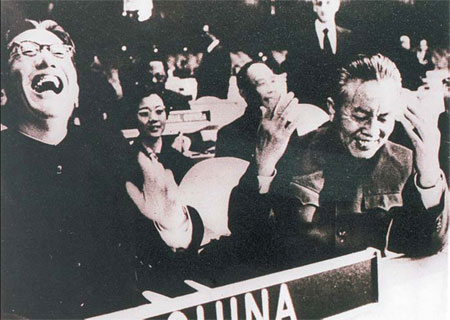In 1972, Huang Hua, as China's permanent representative at the United Nations, again met Kissinger regularly on matters not suitable for the semi-official liaison offices to handle through the hush-hush "New York channel". Deng Xiaoping's visit to the US, establishment of diplomatic relations, and discussions and signing of a joint communique on US arms sales to Taiwan were highlights in which Huang Hua had a direct hand. Consequently, the background to the changed relations between the two powers and its significance and international implications are discussed by the author at length.
 |
| Huang Hua (right) and his colleagues rejoice at the announcement of China's resumption of its United Nations membership on Oct 25, 1971. CNS |
Guided by Deng Xiaoping, Huang Hua as China's foreign minister oversaw the negotiations and final signing of the Sino-Japanese Treaty of Peace and Friendship. He also made strenuous efforts to improve relations with India and the Soviet Union. The three chapters in the memoirs dealing with these events are worthy of special attention, as these are three of China's most important next-door neighbors and how China's relations with them fare makes a difference to peace and prosperity in this part of the world.
In the chapter dealing with India, Huang Hua not only recalled the historical ties between the two countries but also Indian leader Jawaharlal Nehru's support for China's resistance war and the contributions of the famous Indian Medical Mission in Yan'an. There existed deep sympathy between the Chinese and Indian people, so despite the border dispute, common interests really far surpass differences. This was reaffirmed during Huang Hua's meetings with Indira Gandhi and three other Indian prime ministers as well as with Sonia Gandhi, widow of Rajiv Gandhi and president of the Indian Congress Party. In his official or unofficial capacity, Huang Hua also visited many countries in Europe, Africa and Latin America, but they are too numerous to touch upon in this review.
What are the basic principles guiding China's foreign policy? Huang Hua devoted a special section in Chapter 12 to Deng Xiaoping's thinking on this paramount issue. Careful readers will note the descriptions of how Deng, as a strategist and tactician, combined the characteristics of Mao and Zhou and secure many useful pointers to current Chinese foreign policy.
Through reading his memoirs, one can see that this senior diplomat paid special attention to making friends and coming to terms with people of different backgrounds and beliefs. His straight-forwardness and warmth of character proved to be a great plus in liaising with diplomats and leaders. Even after his retirement, he strives to keep up with his wide circle of international friends. As Henry Kissinger pointed out, "I came to admire Huang Hua's diplomatic skills, subtlety and tenacity - all these qualities combined with extraordinary human warmth and reliability."
After his retirement, Huang Hua kept working in many capacities as he had a broad interest. He headed the China Welfare Institute, the child welfare organization founded by Soong Ching Ling, the China Society for People's Friendship Studies, the Great Wall Society and a host of other institutions. In all these capacities, he took the initiative to launch many worthy causes. Even after he had stepped down from all these posts, he maintained his studies, using a computer with an over-sized monitor to keep abreast of the world's development. In Huang Hua's own words, "I still try to stick to my motto, 'It is never too old to learn'."
Age advances imperceptibly but inevitably. Yet with age, one gathers experience and, through continuous learning, deepens understanding. Memoirs enliven and enrich history and provide many useful insights into life. Huang Hua's recollections provide plenty of precious insights into both Chinese diplomacy and modern history, which cannot be found anywhere else.
The author is a former president of the China International Publishing Group
(China Daily November 26, 2008)